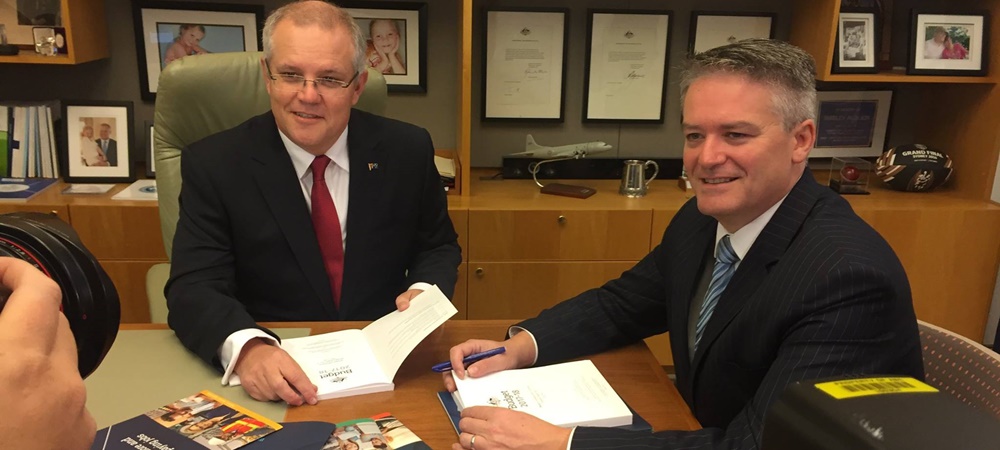Image: Treasurer Scott Morrison and Finance Minister Mathias Cormann.
With lacklustre retail trade figures reported in February and March, the industry was looking to the Federal Budget to deliver on economic growth.
The Australian Retailers Association (ARA) executive director Russell Zimmerman said the disappointing statistics for March—which saw growth of 2.15 per cent year-on-year—are a symptom of escalating operating costs and systemic economic pressures faced by Australia’s retail industry.
“The generally weak trade figures across the board appear to be caused by myriad factors including low consumer confidence, political uncertainty, international competition and the effects of housing affordability on hip-pockets.
“These broader economic issues, combined with a number of challenges within the retail operating environment, are serving to stagnate rather than stimulate growth in the sector.”
So did the Budget deliver?
Budget 2017
In his budget speech Treasurer Scott Morrison acknowledged that many small business owners are currently doing it tough.
“Small business owners are out there fighting for growth in their businesses every day,” he said. “They deserve our respect and support.”
He outlined the government’s plan to extend the popular tax write-off scheme for small businesses, and opened it up to include businesses with revenue up to $10 million.
“Backing up our recently legislated tax cuts, small businesses with a turnover up to $10 million will continue to be able to immediately write off expenditure up to $20,000 for a further year.
“And we will take further action to reward States and Territories that cut red tape costs for small business.”
Industry response
While MYOB CEO Tim Reed said he welcomes the extension of the tax write-off, he believes it should be made permanent.
“The government’s decision to extend the $20,000 instant asset tax write-off for a further year, and to make it accessible to businesses with revenue of up to $10 million, up from $2 million in previous years, is welcome news for SMEs,” he said.
“It encourages business growth and is exactly the type of measure that delivers confidence to the business community.
“However the government should go one step further next year and make the $20,000 write-off permanent.”
This is a sentiment echoed by Adam Joy, CEO of the Australian Lottery and Newsagents Association (ALNA), who said the tax write-off will help retailers upgrade their stores.
“Cash flow is essential for newsagent and lottery retailers, as many are investing in new shop fit components to renew their retail offerings right now,” he said.
“We applaud the government’s extension of the $20,000 instant asset write-off for another year, which will support this investment. We would like to see this become a permanent fixture though as well as the threshold increased, to incorporate more standard small business investments like delivery vans.”
The Australian Retailers Association (ARA) executive director Russell Zimmerman said the Budget is a mixed bag for retailers. He applauded the tax write-off extension but said he was disappointed that the scheme excludes businesses beyond $10 million turnover.
However he commended the government on additional skills funding in the Budget, urging the government to work directly with retailers to address specific skill shortages that affect the core operations of retail businesses.
“On the whole, the 2017 Federal Budget is a step in the right direction for reducing government debt and providing economic conditions conducive to reinvigorating growth in the retail sector,” he said.
In other news…
If you already have budget fatigue, check out these stories that have absolutely no mention of ScoMo (aka Scott Morrison), jobs and growth or spending.
French company Decathlon, the Ikea of sporting goods, has announced its first Australian location. CEO Olivier Robinet said the company is ready to disrupt the Australian market with innovative, low-cost product. Read more on that here.
We took a look at how US Target is future-proofing its stores and investing in 600 next-gen locations. New features include separate entrances for different shoppers. Something for Australian stores to consider? Read about it here.
Quirky gift and gadgets retailer Yellow Octopus has strayed from its pure play online roots and opened a bricks and mortar store. It’s a good case study in combining traditional with tech, and has heaps of interesting in-store features. Check it out here.
We spoke to Natasha Ritz, brand communications manager at Lush, about how the company is engaging Gen Z. And no, they’re not just Gen Y with another name. Click here to find out how to connect with these socially conscious, digital natives.
Our contributor this week is Jeremy Crooks of Pitney Bowes, who tells us how to survive Amazon by embracing the ecommerce revolution. It’s a really informative read about how Australian retailers can leverage their unique advantage when up against global players, so read that here.
Want the latest retail news delivered straight to your inbox? Click here to sign up to the retailbiz newsletter.

